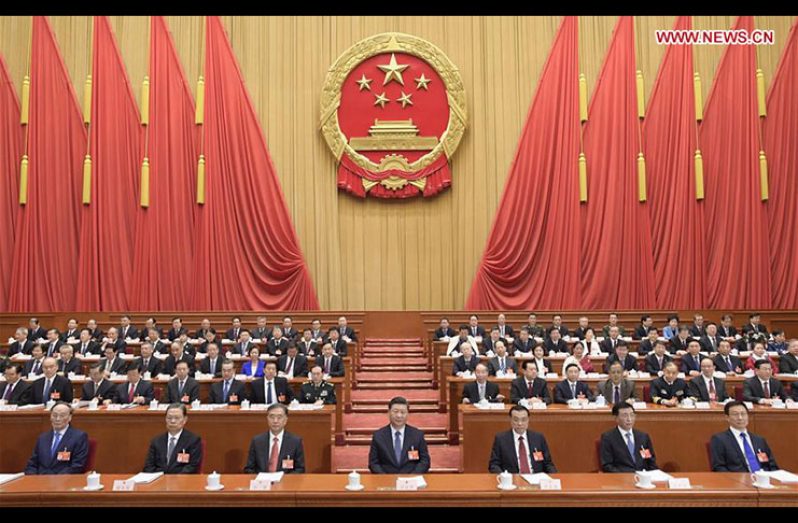BEIJING, March 12 (Xinhua) — China’s annual Two Sessions have always been an important opportunity for the international community to observe where the world’s second largest economy is heading. This year is certainly no exception.
As this year’s Two Sessions continue, poverty reduction, the Belt and Road Initiative (BRI), further opening-up to foreign investment and high-quality growth have become the buzzwords attracting the attention of experts around the world.
POVERTY ALLEVIATION
In the government work report delivered at the opening of the annual NPC session on March 5, China pledges to reduce its population of rural poor by over 10 million this year.
Official figures show that over the past 40 years, China has lifted more than 700 million of its rural residents out of poverty, and the poverty rate — the proportion of people living below the Chinese poverty line — had fallen among the rural population from 97.5 percent in 1978 to 3.1 percent at the end of 2017.
In the eyes of Khairy Tourk, a professor of economics with the Stuart School of Business at the Illinois Institute of Technology in Chicago, “many countries look up to China to learn from its experience.”
“The Chinese experience is based on building a modern infrastructure and then on setting up special economic zones that would help underdeveloped countries to industrialize,” he added.
BRI COOPERATION
The BRI, first proposed by Chinese President Xi Jinping in 2013, refers to the Silk Road Economic Belt and the 21st Century Maritime Silk Road, and aims to build a trade and infrastructure network connecting Asia with Europe, Africa and beyond.
At a press conference on the sidelines of the ongoing Two Sessions, Chinese State Councilor and Foreign Minister Wang Yi said the initiative has become the world’s largest platform for international cooperation and the most welcomed global public good.
He noted that a total of 123 countries and 29 international organizations have signed BRI agreements with China.
Noting that China treats each country on the basis of equality, Tourk said, “I think it’s a matter of time before all nations come to realize the wisdom behind the Belt and Road Initiative.”
China is the only major country in history “that has made the development of poor countries one of its top priorities,” he added. “Through the BRI, many of these nations are fortunate to enjoy Chinese funding and know-how for the building of modern infrastructure and industrial economic zones.”
The BRI, he said, “is going to be the engine of growth in the 21st century.”
FOREIGN INVESTMENT
Another hot topic is the draft law on foreign investment that is expected to be voted on during this year’s Two Sessions.
Cai Hua, a national legislator and director of Wisely Law Office in the northern Chinese city of Tianjin, said that “the emphasis on foreign investment law demonstrates China’s determination to protect intellectual property,” which will increase the confidence of foreign investors.
The draft law, said Tourk, will make “it easier for foreign firms to do business in China.” Mahmoud Raya, editor-in-chief of the “China in Arab Eyes” news website, said the draft law is “considered as a fundamental change in China’s foreign investment management system, which will improve openness, transparency and predictability of the investment environment.”
HIGH-QUALITY GROWTH
In this year’s government work report, China sets its gross domestic product (GDP) growth target for 2019 at 6-6.5 percent, and vows to promote high-quality and sustainable growth.
Elvis Ngolle Ngolle, a professor at the University of Yaounde II in Cameroon, said Chinese innovation is helping to boost economic and social development in other countries, and helping them cultivate their own talent.
A good example, Ngolle said, is the Chinese agricultural technology which “is transforming barren land into fertile farmland in Africa.”
“As China continues to realize more benefits from its reform, the innovative spirit of the Chinese people will continue to flourish, which will contribute even more to the progress of mankind,” he added.
What happens during the ‘two sessions’?
The “two sessions” meetings are held every year in March in China. Here are answers to some frequently asked questions about two of the most important political meetings of the year.
What are the two sessions?
This term refers to the annual plenary sessions of the National People’s Congress (NPC) and the National Committee of the Chinese People’s Political Consultative Conference (CPPCC). The term “two sessions” was coined because the wordy titles are difficult to remember.
What are the NPC and the CPPCC?
The NPC, with almost 3,000 deputies elected from across the country, is the highest organ of State power and the top legislature. It supervises the government and judicial system and determines major State issues. The NPC also appoints and supervises the president, the chief justice and chief prosecutor.
The CPPCC is China’s top political advisory body. It also facilitates China’s multiparty cooperation and political consultation mechanism, led by the Communist Party of China. The CPPCC was established in 1949, five years before the NPC.
What happens at these sessions?
Routine tasks at the annual NPC meeting include reviewing the annual work report of the central government, which includes the official gross domestic product forecast; hearing work reports by the NPC Standing Committee, the Supreme People’s Court and the Supreme People’s Procuratorate; and reviewing the annual plan for economic and social development and the central and local budgets. This year, an additional task is deliberating draft provisions of a new, unified Chinese Civil Code.
Members of the CPPCC National Committee gather to discuss important political, economic and social matters and make proposals.



.jpg)









